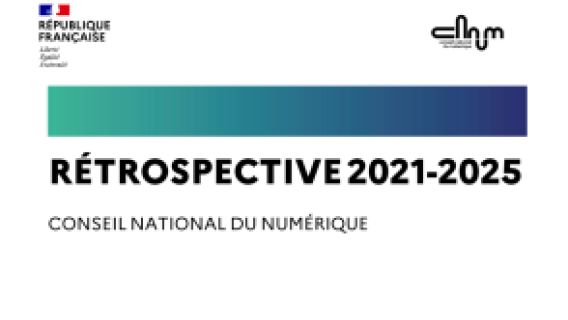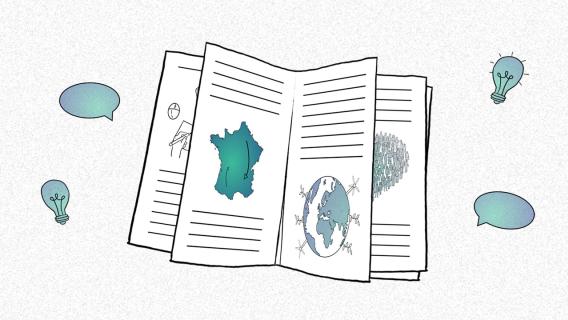Présentation du processus de concertation Ambition numérique devant @OCDE @UIT
OECD-ITU Innovation Dialogue
Résumé de l’intervention de Yann Bonnet,
Secrétaire général du CNNum lors du dialogue sur l'innovation organisé par l'UIT et l'OCDE.
Policy experimentation allows policymakers to create more effective policy by engaging with opportunity owners and creating adaptive policy balanced with political concerns.
2016 Ministerial Meeting – June 23 – Mexico
1/ French Digital Council
- The Conseil national du numérique is an independent advisory commission. It was created 5 yrs ago and our mission is to advise the French government on any questions related to the impact of digital technologies on the economy and society
- The board is composed of 30 members, all appointed for 3 years by the French President and they represent the digital ecosystem at large. It gathers researchers, entrepreneurs, VCs, activists and representatives of the civil society, in a very multistakeholder approach.
We issue opinions, reports and recommendations, and we can do so on a vast spectrum of topics: from net neutrality to online platforms, e-health, education, tax models or... of course, e-government.
Apart from this mission, the Council is really meant to be an interface between the government and the digital ecosystem. We like to consider ourselves as a “public lobby”, a lobby for those who don’t have one – citizens, SMEs, startups who don’t have the time, the money to assert their interests in front of public authorities.
2/ Consultation
This is what we achieved last year, when the French PM asked the Council to lead a national consultation on digital issues.
This consultation lasted for 5 months (from October 2014 to February 2015). The goal was to collect recommendations and ideas to redesign France’s digital policies.
This experiment was unique for several reasons:
- we chose to address a vast scope of subjects:
- from, Human rights in the digital environment
- to growth and innovation issues
- or the digital transformation of public action
- It was unique, mainly because of its process. We worked very hard to make this consultation as transparent and open as possible, by using both technologies and traditional consultation tools.
- To do so, we launched an online platform called “Digital Ambition for France”.This platform allowed any citizen, private organisation, public or non-profit institutions to contribute online to the debate. We got around 20 000 (twenty thousands) contributions.
- On the same time, we organized 4 major meetings in different French cities, asking innovators to come and pitch their ideas and initiatives. We went to Strasbourg, Lille, Bordeaux and Nantes.The purpose of these meetings was to further examine topics that where discussed on line. At the end of the workshops, we encouraged people to publish their contributions on the platform.
- Last but not least, we created a Do it Yourself kit with a makestorming startup, called Nod-a.
- With this kit, any stakeholder could organize its own workshop on any part of the country. They just had to respect one condition : publish their ideas on the platform at the end of their discussion
- With this kit, the consultation quickly became a network of workshops all over France. More than 70 (seventy) workshops were organized by universities, mayors of small towns, professional federations and even – this is a true story - a retirement home..
- We spent months reading those thousands of contributions, analysing each and everyone of them. The summaries that we drafted were neutral and open to coments. And on this rich basis, the Council was able to issue 70 recommendations.
3/ So, was it worth it? Did it have any effect on the decision-making process?
A year later, we are pleased to note that most of our recommendations are now being implemented, either into law (with the bill that is currently being discussed in Parliament) or in the industrial strategy of the government. Some of these recommendations are being appraised by the European Commission – with which we have a useful dialogue.
This consultation gave birth to the Bill for a ‘Digital Republic’ carried by Axelle Lemaire, which is the continuation of this innovative process because the government chose to launch a second consultation, this time on the text itself.
This means that for the first time, a French bill was subjected to comments and modifications from Internet users before being submitted to the Parliament. Every article of the proposed bill could be amended and new provisions could be proposed.
The Government used the same platform as we did, and they got more than a hundred thousand contributions from the public. Once they had been studied, some of these contribution could make their way to the final text. The government made a great transparency effort because it clearly outlined the legislation following the consultation, for an easier follow-up. It would also officially reply to the suggestions that were the most popular amongst users.
Both these consultations were a success. But... more importantly, they are good case studies for this kind of experiments.
This second consultation was the occasion to improve and reinforce the bill:
- more than 90 modifications were integrated : for instance, we went from a 12 to a 6 months embargo for open access on scientific research for hard science, due to a strong mobilization of the research communiy.
- 5 new articles were added on topics like data protection, open data. The most popular one was the article that gave a legal framework for e-sport compétition: it got 5000 (five thousands) votes in only 48 (fourty eight) hours !
- But some proposals had been excluded from the Bill, for instance the one that forced public institutions to use firstly open source software
Well indeed, both these consultations had certain limitations:
- First, the public who participated was not representative of the entire French population. The government provided us with interesting figures, from their satisfaction survey. We know that about:
- 70% declared that they voted to all elections.
- 62% hold a degree in higher education.
>> This is striking. In both these consultations, it seems that the average contributor was a white male, usually from a upper socio-professional category, urban, educated.
- Second, the ranking of proposals by votes could be biased: for exemple, the most voted proposal tended to the recognition of e-sport. It got 5 000 votes in 48 hours, but this was all following a call for mobilization from the gamer community (and especially one famous forum). In this case, it seems that the consultation had more of a petitioner function.
- Last - some proposals, including the most voted, were absent from the bill. For example, the contributors massively votedin favor of a greater use of open source in the administration, yet this proposal couldn’t make its way to the bill that was presented to Parliament. On this, the government might have faced an important lobby.
- One major element that we learned from this experiment is that we cannot achieve a public consultation without thinking about how we can include all the citizens in the process.
- Some of them do not have the digital capabilities to contribute online, so we need to find other ways to make them participate to public debates.
- That’s why we organised physical meetings besides the online platform, to enable people who don’t usually express themselves on the Internet to share ideas and propositions
- Digital mediation and education are key factors for building a digital democracy
- We are convinced that we need to give everyone the core digital skills to understand the world they are living in and play a part in it.
- Digital litteracy is a must if we want to organise public consultation on a general basis. We have to keep in mind that digitalization is not only a technological breakthrough, it’s also a political and social evolution. It has the power to shape a different society. And it’s an extremely fast process
Conclusion
I would just add the fact that civil services have to be strongly integrated in the process. These new ways of making public policies raise the question of the relationships between 2 temporalities, and 2 kinds of expertise. The one of the administration, and the one of the public.
- As you know, this year will be a turning point in France since all the members of Open Government Partnership are expected in Paris next december, to follow up their action plans and define new guidelines for the future. The French Government is looking forward to increase international cooperation on promoting transparency and open decision-making models.
- But this will also be a challenge for French political organisation since the presidential elections are coming. We hope that this will be an opportunity to experiment new ways to get citizens involved into political life.
Thanks.




